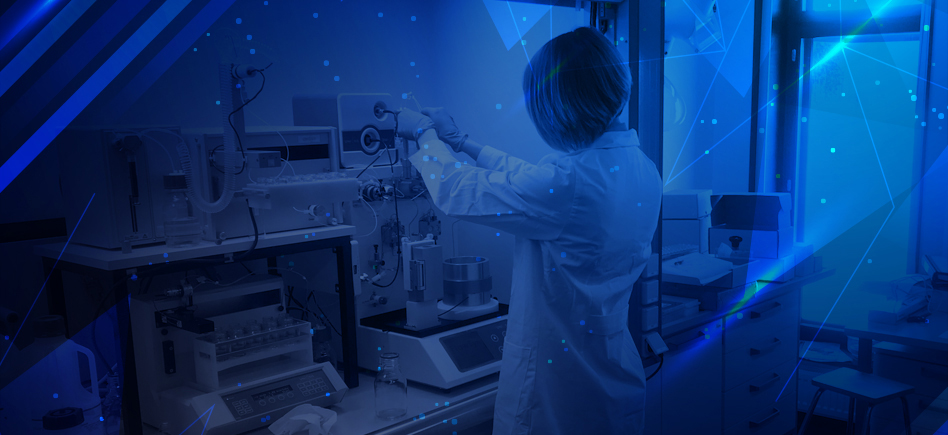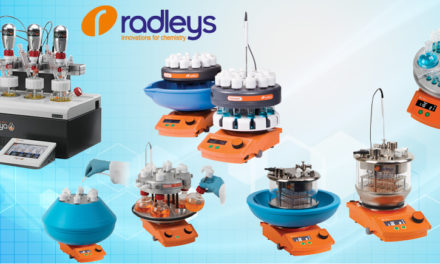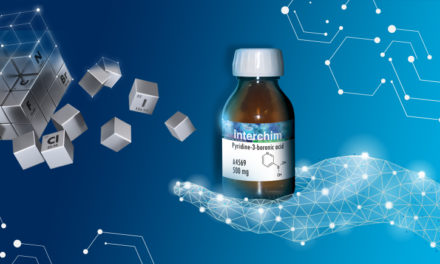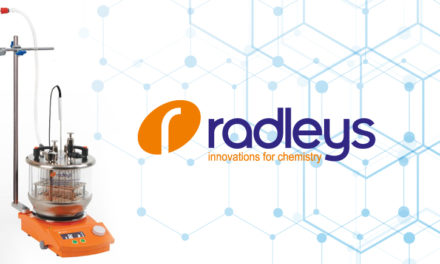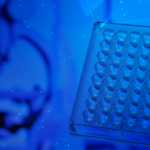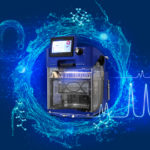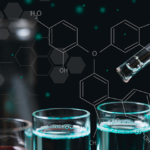The concept of “flow chemistry” defines a very general range of chemical processes that occur in a continuous flowing stream, conventionally taking place in a reactor zone.
The application of flow chemistry relies on the concept of pumping reagents using many reactors types to perform specific reactions.
The most common types of reactors are plug flow reactors and column reactors, whilst for specific chemistries more sophisticated reactor designs might be needed (e.g., photoreactors, electrochemical reactors, etc).
Set-Up:
Figure 1 shows an example of a schemtic of a flow system.

Figure 1
A flow system includes:
a) At least one pump with good chemical compatibility,
b) Manual or automatic valves,
c) A flow path,
d) A T,
e) A coil reactor or a glass mixer block/chip reactors for homogeneous syntheses,
f) A column reactors for heterogeneous syntheses,
g) A module for heating or heating/cooling,
h) Back pressure regulators.
Advantages of flow chemistry:
There are well-defined key advantages using flow technologies as compared to standard batch and microwave chemistry methods.
Flow chemistry, improves heat transfer & mass transfer/mixing for faster reactions, by superheating at elevated pressure.

Flow chemistry allows:
– To have high reproducibility and scalability, for instance, continuous processing can deliver 100s g to 10 Kg per day.

– To have extreme reaction conditions (high/low temperature, high pressure).
| FlowSyn PTFE | FlowSyn Steel | FlowSyn Hastelloy | |
| Flow path | All PTFE | PTFE & 316L | PTFE & HC-276 |
| Pmax | 40bar (600psi) | 100bar (1450pas) | 100bar (1450pas) |
| Tmax | 150°C | 300°C | 300°C |
| Chemical resistance | Excellent | Very good | Excellent |
| Boiling point °C @ |
|||
| 1 bar | 6.9 bar | 17.0 bar | |
| CH2Cl2 |
41 | 109 | 153 |
| MeOH | 65 | 138 | 185 |
| THF | 66 | 140 | 186 |
| iPrOH | 82 | 159 | 207 |
| MeCN | 82 | 159 | 207 |
| H2O | 100 | 181 | 231 |
| Dioxane | 101 | 182 | 234 |
| DMF | 153 | 244 | 301 |
| DMA | 165 | 259 | 318 |
▀ Useful solvents for flow with bp exceeding 150°C
– To do multistep (telescoping),
– To have in-line downstream processing,
– To make it possible to automate,
– To improve safety and mange hazardous reagents and intermediates, small reactor volumes minimize risk associated with hazardous intermediates.

Innovative Advion Interchim scientific solutions
For flow chemistry applications, Advion Interchim scientific offers innovative pre-configured innovative flow chemistry platforms and modules to add to them, or to create a specific tailor-made system.

Innovative pre-configured flow chemistry plateforms
Manual control : FlowLab™
Entry level flow chemistry system
- 2 x HPLC pumps with pressure transducers and manual inlet selection valves; 0.01 to 10.0 mL/min, Pmax =100bar (2 each)
- HotCoil reactor station ambient to 260°C (300oC option)
- Coil reactors: 5.0mL stainless steel and 5.0mL PTFE Vcoil reactors (1 each),
- Laptop with FlowLab control application installed
- PTFE “T”-piece mixer and connecting tubing
- 100psi fixed back pressure regulator and PEEK holder
- Bottles and caps
- Ethernet Hub and Wi-Fi router
Automated control : FlowLab™ Plus
Modular flow chemistry system
- 1 x HPLC binarie pumps with pressure transducers and manual inlet selection valves; 0.01 to 10.0 mL/min, Pmax =100bar (2 each)
- Polar Bear Plus Flow cryogenic reactor station –40°C to 150°C
- 5.0mL and 14.0mL PTFE HT coil reactors (1 each),
- Laptop with FlowLab control application installed
- PTFE ‘T’-piece mixer and connecting tubing
- 100psi Fixed BPR cartridge and PEEK holder
- Bottles and caps
- Ethernet Hub and Wi-Fi router
Integrated flow reactor : FlowSyn™ & FlowSyn™ Multi X
Integrated flow chemistry system: FlowSyn™
- Carry out superheated reactions up to +260°C and 100bar
- Wide range of coil, chip and column reactors available in a variety of materials for optimal chemical compatibility
- Automated, chemically resistant sample injection valves
- Seamlessly scale up reactions up to and 100mL/min (FlowSyn Maxi)
- Choose flow path from PTFE, 316L stainless steel or Hastelloy C
- Future proof – numerous hardware and software upgrade options available for maximum flexibility
- Fully integrated systems for total ease of use
Integrated flow chemistry system: FlowSyn™ Multi X
- Automatically runs up to 10 sequential experiments
- Vary reaction temperature, residence time and stoichiometry
- Choice of ‘optimization’ or standard ‘fractionation’ protocols
- Integrated control interface – no need for a separate PC
- Single and 4 rack fraction collector options
- Compact footprint
- Automated sample loop injection valves for compound library synthesis
Integrated flow chemistry system: FlowSyn™ Auto-LF – 2 or 4 channel system
- Automate experiments with multiple combinatorial reagent inputs
- Powerful intuitive PC interface for real-time reaction monitoring and data logging
- Stacked, small format XYZ sampler/fraction collector minimizes space requirements
- In-built automated wash protocols
- No unreliable sample injection ports
- Septum-piercing liquid handling ensures reagent solutions are preserved
- Air bubbles prevent sample dispersion when loading sample loops to minimize reagent wastage
- System shown includes optional inline UV/Vis detector
Modules for innovative pre-configured flow chemistry platforms and bespoche systems

Pumps
 |
Stand alone Pump Module
|
 |
Binary Pump Module
|
Reactors
 |
Coil reactors
|
 |
Column reactors
|
 |
HotColumn
|
Modules to heat or heat/cool
 |
HotCoil
|
 |
HotChip
|
 |
Polar Bear Plus
|
Modules to cool
 |
Cold Coil
|
 |
Polar Bear
|
Flow Photochemistry
Flow Electrochemistry
Gas module additions
 |
Teflon® AF-2400 Gas Permeability [cB]
|
Bottles, tubing, T, fittings, valves, BPR
Know more:
- Visit our website www.interchim.com for more details
- Contact us: chemistry.tools@advion-interchim.com

